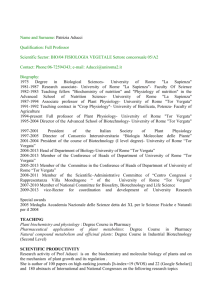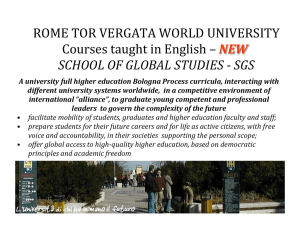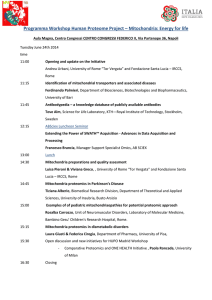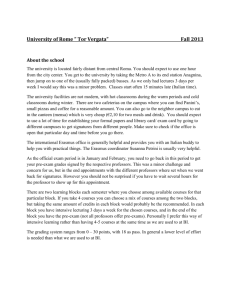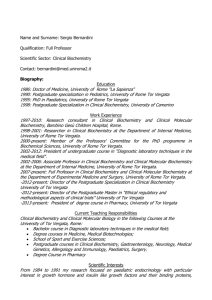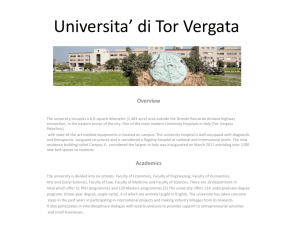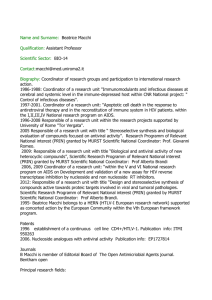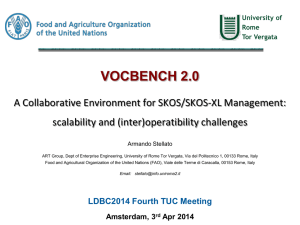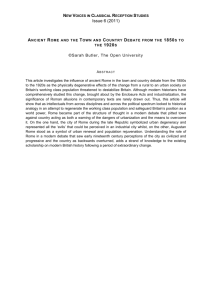9.30 Capital Market Imperfections, High
advertisement
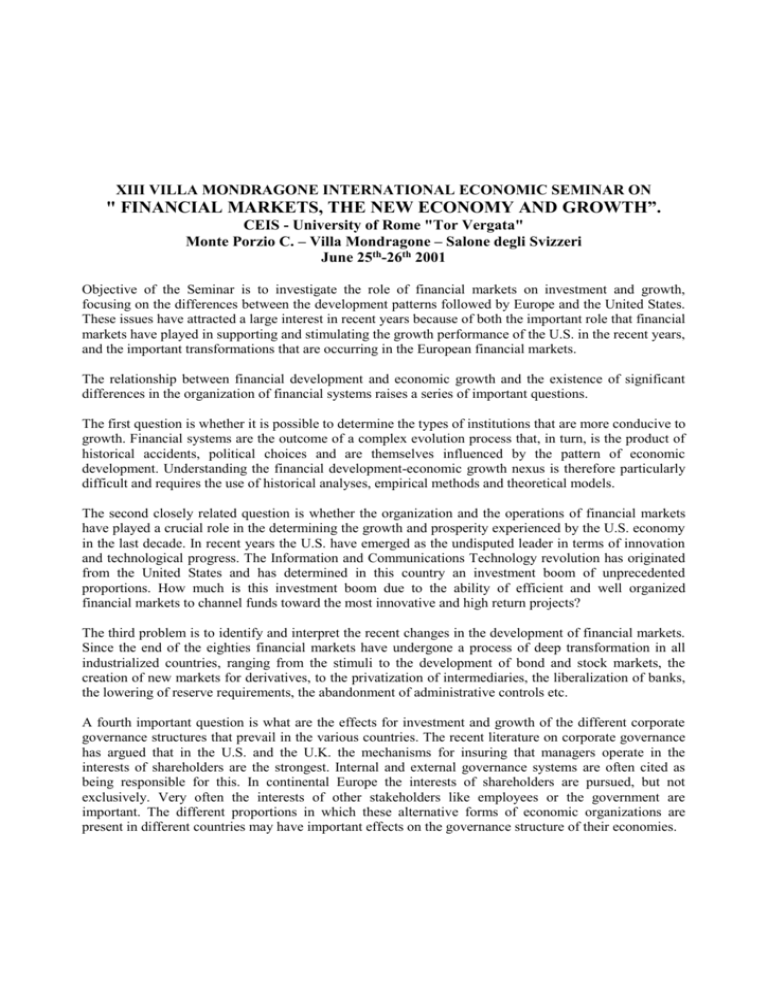
XIII VILLA MONDRAGONE INTERNATIONAL ECONOMIC SEMINAR ON " FINANCIAL MARKETS, THE NEW ECONOMY AND GROWTH”. CEIS - University of Rome "Tor Vergata" Monte Porzio C. – Villa Mondragone – Salone degli Svizzeri June 25th-26th 2001 Objective of the Seminar is to investigate the role of financial markets on investment and growth, focusing on the differences between the development patterns followed by Europe and the United States. These issues have attracted a large interest in recent years because of both the important role that financial markets have played in supporting and stimulating the growth performance of the U.S. in the recent years, and the important transformations that are occurring in the European financial markets. The relationship between financial development and economic growth and the existence of significant differences in the organization of financial systems raises a series of important questions. The first question is whether it is possible to determine the types of institutions that are more conducive to growth. Financial systems are the outcome of a complex evolution process that, in turn, is the product of historical accidents, political choices and are themselves influenced by the pattern of economic development. Understanding the financial development-economic growth nexus is therefore particularly difficult and requires the use of historical analyses, empirical methods and theoretical models. The second closely related question is whether the organization and the operations of financial markets have played a crucial role in the determining the growth and prosperity experienced by the U.S. economy in the last decade. In recent years the U.S. have emerged as the undisputed leader in terms of innovation and technological progress. The Information and Communications Technology revolution has originated from the United States and has determined in this country an investment boom of unprecedented proportions. How much is this investment boom due to the ability of efficient and well organized financial markets to channel funds toward the most innovative and high return projects? The third problem is to identify and interpret the recent changes in the development of financial markets. Since the end of the eighties financial markets have undergone a process of deep transformation in all industrialized countries, ranging from the stimuli to the development of bond and stock markets, the creation of new markets for derivatives, to the privatization of intermediaries, the liberalization of banks, the lowering of reserve requirements, the abandonment of administrative controls etc. A fourth important question is what are the effects for investment and growth of the different corporate governance structures that prevail in the various countries. The recent literature on corporate governance has argued that in the U.S. and the U.K. the mechanisms for insuring that managers operate in the interests of shareholders are the strongest. Internal and external governance systems are often cited as being responsible for this. In continental Europe the interests of shareholders are pursued, but not exclusively. Very often the interests of other stakeholders like employees or the government are important. The different proportions in which these alternative forms of economic organizations are present in different countries may have important effects on the governance structure of their economies. MONDAY, June 25th 10.00 Registration of Participants 10.15 Welcoming Address A. FINAZZI AGRO’, Rector, University of Rome “Tor Vergata” L. PAGANETTO, Dean, Faculty of Economics, University of Rome “Tor Vergata” FIRST SESSION The Macroeconomics of Finance and Growth: Theoretical and Empirical Issues (1) 10.30 International Competitiveness, the New Economy and Growth in the G7 Countries D. SALVATORE, Fordham University, New York 11.00 Ingredients for the New Economy: How Much does Finance Matter? S. ROSSI, Banca d’Italia 11.30 A Model of Innovation and Growth? B. AMABLE, CEPREMAP, Paris 12.00 Contributions of Financial Systems to Growth in OECD Countries M. LEAHY, OECD, Paris 12.30 Financial Deepening Trade Opennes and Growth: a Multivariate Cointegrate Analysis of the Complementary Effects S. GINEBRI, L. SABANI and G. PETRIOLI (University of Rome “La Sapienza”) 13.00 Discussion 13.30 Lunch SECOND SESSION The Macroeconomics of Finance and Growth: Theoretical and Empirical Issues (2) 14.30 Asset Valuation, Liquidity and Growth Regimes J.P. FITOUSSI, OFCE, Paris and J.L. GAFFARD, University of Nice Sophia Antipolis, Valbonne and OFCE, Paris 15.00 Factor Saving Innovation D. LEVINE, UCLA, Los Angeles and M. BOLDRIN, University of Minnesota 15.30 ICT “Bottlenecks”, Financial Markets and Growth L. BECCHETTI and F. ADRIANI, University of Rome “Tor Vergata” 16.00 Does Financial Sector Development Bring Growth and Stability? P. WACHTEL, Stern School of Business, New York University 16.30 Financial Structures and Growth Regimes F. BELLONE and M. DAL-PONT, CNRS, Valbonne 17.00 Discussion TUESDAY, June 26th THIRD SESSION Stock Market, Microstructure and Innovation (1) 9.30 Capital Market Imperfections, High-Tech Investment and New Equity Financing R. CARPENTER , UMBC, Baltimore and B. PETERSEN, Washington University in St. Louis 10.00 Organisation of Stock Exchanges and Productivity I. HASAN, Institute of Technology and Bank of Finland 10.30 Finance, Technology and Risk L. PAGANETTO and P.L. SCANDIZZO, University of Rome “Tor Vergata” 11.00 Marginal Q, Tobin’s Q, Cash Flow and Investment D.C. MUELLER, K. GUGLER and B. YURTOGLU, University of Vienna FOURTH SESSION Stock Market, Microstructure and Innovation (2) 11.30 Growth Cycles and Market Crashes M. BOLDRIN, University of Minnesota and D. LEVINE, UCLA, Los Angeles 12.00 Financial Structure and Heterogeneity of Beliefs: Implications for the Financing of Innovation B. OLIVIER and M. DAL-PONT, LATAPSES, CNRS, Valbonne 12.30 Small Firms and the Internet G. FERRI, University of Bari, M. GALEOTTI, University of Bergamo and O. RICCHI, Italian Ministry of Treasury 13.00 IPOs and the Growth of Firm G. CLEMENTI, Carnegie Mellon University, Pittsburgh 13.30 Lunch 14.30 TAVOLA ROTONDA "Quale ruolo del mercato finanziario per lo sviluppo della new economy in Italia ed Europa?" Partecipano: Renato BRUNETTA (Università “Tor Vergata” e Parlamento europeo), Giampaolo GALLI (Confindustria), Stefano MICOSSI (Assonime), Mario SARCINELLI (Università “La Sapienza”). Conclude il Vice Ministro dell’Economia, Mario Baldassarri. Scientific Board *********** Luigi PAGANETTO Leonardo BECCHETTI Fabrizio MATTESINI Scientific Secretariat Carmen TATA ph. 0672595615, fax 062020687 tatac@uniroma2.it Organizing Board P.R. and Communication Ester APPRUZZESE, Antonello D’ANGELO, Maria Carla IAVARONE, Susanna PETRINI, Barbara PIAZZI Simonetta PATTUGLIA, Amalia CAROSI, Francesca R. GELOSIA, Daria PIGNEDOLI ph. 0672595510, fax 0672595528-04 pattuglia@economia.uniroma2.it
